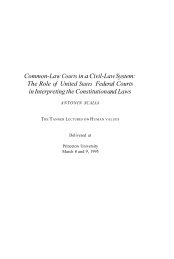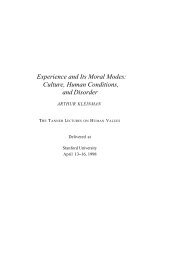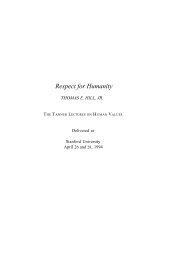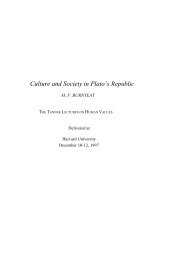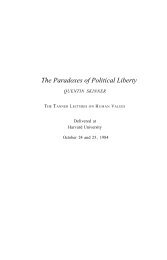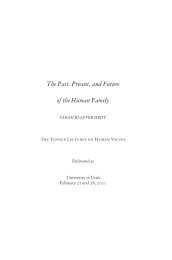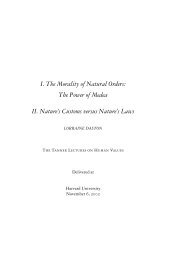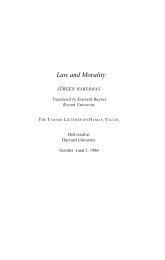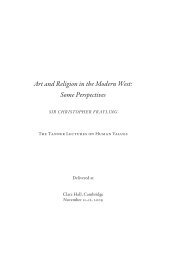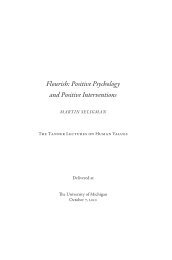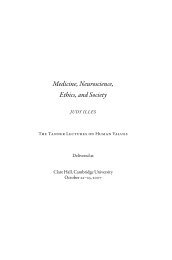Muguerza, Javier - The Tanner Lectures on Human Values
Muguerza, Javier - The Tanner Lectures on Human Values
Muguerza, Javier - The Tanner Lectures on Human Values
Create successful ePaper yourself
Turn your PDF publications into a flip-book with our unique Google optimized e-Paper software.
100 <str<strong>on</strong>g>The</str<strong>on</strong>g> <str<strong>on</strong>g>Tanner</str<strong>on</strong>g> <str<strong>on</strong>g>Lectures</str<strong>on</strong>g> <strong>on</strong> <strong>Human</strong> <strong>Values</strong>establish coactive norms, because no <strong>on</strong>e can know - at least notat present - to what degree it is possible to reduce aggressi<strong>on</strong> andachieve a voluntary recogniti<strong>on</strong> of the ‘principle of discourse,’ . . .<strong>on</strong>ly in this latter case, which for the moment is no more than ac<strong>on</strong>struct, would morality become strictly universal, in which caseit would also cease to be ‘mere morality’ in the sense of the usualdistincti<strong>on</strong> between law and morality.” 48(<str<strong>on</strong>g>The</str<strong>on</strong>g>re is no need toinsist <strong>on</strong> the Hegelian overt<strong>on</strong>es of these paragraphs, where -rather than bringing ethics closer to law-it would be moreproper to speak of their mixture, with politics included, <strong>on</strong>ce theaforementi<strong>on</strong>ed mere morality had been overcome.)Habermas has reiterated his viewpoint in a recent essay-“Wie ist Legitimität durch Legalität möglich?” (1987)- where,in the course of attempting to answer the questi<strong>on</strong> “how can legitimacybe achieved through legality?” the general sense of his positi<strong>on</strong><strong>on</strong> the problems of grounding that we have been discussingis c<strong>on</strong>siderably clarified. 49Habermas takes them up in the process of defending the thesisthat the aut<strong>on</strong>omizati<strong>on</strong> of law-effected in modern times withthe help of rati<strong>on</strong>al law (the Kantian Vernunftrecht), whichrendered possible the introducti<strong>on</strong> of differences into the previouslysolid block of morality, law, and politics-cannot meana complete divorce between law and morality, <strong>on</strong> the <strong>on</strong>e hand,or politics, <strong>on</strong> the other, since law that has become positive cannotdo without its inner relati<strong>on</strong>ship with either of the two. Habermas,then, c<strong>on</strong>siders Austin’s or Kelsen’s c<strong>on</strong>cept of juridical aut<strong>on</strong>omy(to which we referred a short while ago) indefensible, and hethen asks how the aforementi<strong>on</strong>ed aut<strong>on</strong>omizati<strong>on</strong> of law waseffected. <str<strong>on</strong>g>The</str<strong>on</strong>g> turning point comes with modern rati<strong>on</strong>al law,which-in c<strong>on</strong>necti<strong>on</strong> with the theory of the social c<strong>on</strong>tract48 J. Habermas, Legitimati<strong>on</strong>sprobleme in Spätkapitalismus (Frankfurt am Main,1973), 87.49 Habermas, “Wie ist Legitimität durch Legalität möglich?” Kritische Justiz 20(1987): 1-16.



